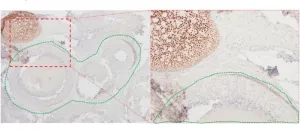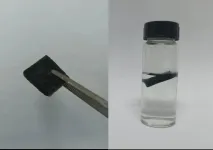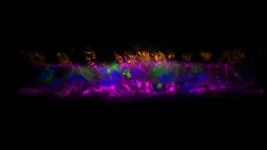(Press-News.org) August 1, 2023, Mountain View, CA – The SETI Institute is proud to announce that Dr. John Rummel will receive the prestigious 2023 Drake Award, recognizing his extraordinary and innovative programmatic contributions and unwavering advocacy for SETI and astrobiology. Rummel’s illustrious career has included roles at NASA Headquarters, where he served as Senior Scientist for Astrobiology, Planetary Protection Officer, Deputy Chief of the Mission from Planet Earth Study Office, and Program Scientist for SETI/High Resolution Microwave Survey. Despite sometimes facing significant opposition, Rummel has been an unwavering supporter of SETI science and funding, working to ensure the field’s recognition as an important scientific discipline. These and his other contributions to astrobiology, planetary protection and space policy have left a lasting impact on current and future space exploration and use by both robots and humans.
Named in honor of Dr. Frank Drake, the SETI Institute's first president of its Board of Trustees and renowned creator of the Drake Equation, the Drake Award celebrates outstanding achievements in SETI and astrobiology. Drake, often called the father of SETI, conducted the pioneering Project Ozma, the first SETI experiment, at the Green Bank Radio Observatory in 1960. His Drake Equation serves as a roadmap for astrobiology. Drake award recipients are nominated by the SETI Institute’s Science Advisory Board and approved by its Board of Trustees. This year’s Drake Awards will be the first one since Drake passed away in 2022, leaving a profound legacy.
“This is totally unexpected – but a lot of fun! – to be honored in this way by the SETI Institute”, said Rummel. “I was lucky in that I never had to make a career choice, but instead was able to go where I thought my talents and interests might do the most good, and that has allowed me to work with some amazing people and institutions. The SETI Institute has given those people both an institutional home and a goal to understand life in the universe, and I am proud to have contributed to that in my own small way.”
“John Rummel’s career has covered so many facets of space science and exploration, both manned and unmanned. Very few scientists have had such far-reaching impact on SETI and astrobiology and the critically important, yet poorly understood field of planetary protection,” said Bill Diamond, CEO of the SETI Institute. “We are delighted to have this opportunity to honor John’s extraordinary work and his lifelong commitment to the study of life in the Universe.”
Since being established in 2001, exceptional individuals, including Frank Drake, have received the Drake Award:
Frank Drake, for innovation in SETI and life in the Universe research
Charles Townes, for visionary advocacy for optical SETI
William Borucki, for revolutionary contributions to exoplanet research as PI for the Kepler Space Telescope
Victoria Meadows, for seminal contributions to astrobiology and exoplanet research
Jason Wright, for groundbreaking achievements in exoplanet and SETI research
Paul Horowitz, for pioneering work in SETI Instrumentation for both radio and optical SETI searches
Dan Werthimer, for developing novel radio spectrometers as well as optical SETI detection systems
Shelley Wright, for her innovative development and use of new instruments for optical SETI
The 2023 Drake Awards presentation will take place on September 14, 2023, at a public event held at SRI International in Menlo Park, CA. The SETI Institute will live stream the presentation via Zoom for those unable to attend in person. Dr. Moiya McTier, astrophysicist, folklorist and author, will host the 2023 Drake Award event. Alongside the Drake Award, additional honorees will receive the SETI Forward Award, aimed at inspiring future scientists to pursue careers in the search for life in the universe, and the Carl Sagan Director’s Award, recognizing outstanding achievements in astrobiology, technology and exploration of life in the universe.
For more information about the 2023 Drake Awards, please visit our website here: https://drakeawards.seti.org/
Tickets can be purchased here: https://www.seti.org/event/2023-drake-awards
John Rummel’s Bio:
Prior to his recent focus on business with Friday Harbor Partners, John Rummel was a visiting scholar at McGill University’s Institute of Air and Space Law (Montréal) and a Senior Scientist with the SETI Institute. Earlier, he was the founding Director of the Institute for Coastal Science and Policy and retired as Professor of Biology at East Carolina University (Greenville, NC). This year he stepped down as the representative of the International Union of Biological Sciences (IUBS) to the International Science Council’s Committee on Space Research (COSPAR) where he was also the former (and founding) Chair of COSPAR’s Panel on Planetary Protection, and led the development of COSPAR’s unified policy and its current approach to addressing planetary protection concerns. More recently, Rummel represented COSPAR on The Hague International Space Resources Governance Working Group, which developed approaches to establishing a legal regime that would promote the orderly and productive use of in-space resources.
A former member of the NASA Advisory Council’s Planetary Protection Subcommittee, Rummel previously worked at NASA Headquarters (1986 to 1993 and 1998 to 2008) as NASA's Senior Scientist for Astrobiology and as NASA's Planetary Protection Officer (PPO). Between NASA assignments, he was the Director of Research Administration and Education at the Marine Biological Laboratory in Woods Hole, Massachusetts. After his postdoctoral work at NASA Ames Research Center, Rummel first served NASA as Exobiology Program Manager and Research Programs Branch Chief in the Life Sciences Division, arriving in 1986. He was responsible for the Life Support and Exobiology Implementation Teams under the US-USSR Joint Working Group in Space Biology and Medicine, and also developed an Antarctic Space Analog Program as a joint activity with several NASA Centers and the National Science Foundation’s Office of Polar Programs. A holder of eight NASA Group Achievement Awards, Rummel is also a Fellow of the American Association for the Advancement of Science (1990) “for leadership in fostering NASA-sponsored life science research,” the recipient of the Life Sciences Award from the International Academy of Astronautics (2005) “for significant and lasting contributions to the advancement of the astronautical sciences,” and was awarded the NASA Exceptional Performance Award (2008) “for outstanding management of space science programs...”
Rummel received his PhD in community ecology and evolution from Stanford University and his undergraduate degree in environmental biology from the University of Colorado.
About the SETI Institute
Founded in 1984, the SETI Institute is a non-profit, multi-disciplinary research and education organization whose mission is to lead humanity's quest to understand the origins and prevalence of life and intelligence in the universe and share that knowledge with the world. Our research encompasses the physical and biological sciences and leverages data analytics, machine learning, and advanced signal detection technologies. The SETI Institute is a distinguished research partner for industry, academia, and government agencies, including NASA and the National Science Foundation.
END
John Rummel to be honored with the SETI Institute’s 2023 Drake Award
The SETI Institute recognizes John Rummel for extraordinary contributions and advocacy for SETI and astrobiology.
2023-08-01
ELSE PRESS RELEASES FROM THIS DATE:
Beatson Foundation awards grant to Boston College biologist Emrah Altindis for Type 1 diabetes research
2023-08-01
Chestnut Hill, Mass. (08/01/2023 - Boston College Assistant Professor of Biology Emrah Altindis has received a two-year, $275,000-grant from the Beatson Foundation to explore the role of gut microbes and viruses triggering the autoimmunity of Type 1 diabetes.
“Our lab is extremely grateful for the generous funding bestowed upon us by the Beatson Foundation,” Altindis said. “The receipt of this grant has evoked a profound sense of both excitement and gratitude within our team. We recognize the significant impact this funding will have on our research endeavors, particularly in the field of Type 1 Diabetes.”
Funding for the project, titled ...
North Atlantic Oscillation contributes to ‘cold blob' in Atlantic Ocean
2023-08-01
UNIVERSITY PARK, Pa. — A patch of ocean in the North Atlantic is stubbornly cooling while much of the planet warms. This anomaly — dubbed the "cold blob" — has been linked to changes in ocean circulation, but a new study found changes in large-scale atmospheric patterns may play an equally important role, according to an international research team led by Penn State.
“People often think the atmosphere has a very short memory, but here we provide evidence that atmospheric circulation change is significant enough to induce some long-term impact on the climate system,” ...
MSU leads Office of Naval Research grant to make AI more reliable and transparent
2023-08-01
Highlights:
Michigan State University researchers are leading a $1.8 million grant project funded by the Office of Naval Research to evolve artificial intelligence.
The research would make it possible to use AI more reliably for tasks we already accomplish with help from popular AI tools like ChatGPT. It could also enable people to entrust AI systems with more advanced jobs that rely on understanding language and visual information, including education, navigation and multimodal question-answering systems.
The team is working to connect “classical” or symbolic AI with current deep neural networks and create a neuro-symbolic framework. ...
Multiclonality of estrogen receptor expression in ductal carcinoma in situ (DCIS)
2023-08-01
“We have discussed in detail the clinical implications of ER in avoiding overtreatment and undertreatment in DCIS.”
BUFFALO, NY- August 1, 2023 – A new editorial paper was published in Oncotarget's Volume 14 on July 20, 2023, entitled, “Multiclonality of ER expression in DCIS – Implications for clinical practice and future research.”
Estrogen receptor (ER) expression is not routinely evaluated in ductal carcinoma in situ (DCIS). This may be because the prognostic role of ER in DCIS was unclear until the UK/ ANZ DCIS trial in 2021 showed that lack of ER expression in DCIS was associated with a greater than 3-fold risk of ipsilateral recurrence. This ...
Score, then rank: Researchers propose an integrated approach to grant review assessments
2023-08-01
The public funding of science is responsible for many of the biomedical and other scientific breakthroughs on which our lives depend. However, the process through which funding decisions are made, the peer review of grant proposals, has been historically understudied, and current approaches can lead to undesirable outcomes. Writing in Research Integrity and Peer Review, Stephen A. Gallo, then affiliated with the American Institute of Biological Sciences, and Michael Pearce, Carole J. Lee, and Elena A. Erosheva from the University of ...
A floating sponge could help remove harmful algal blooms
2023-08-01
In the peak heat of summer, beachgoers don’t want their plans thwarted by harmful algal blooms (HABs). But current methods to remove or kill toxin-producing algae and cyanobacteria aren’t efficient or practical for direct applications in waterways. Now, researchers reporting in ACS ES&T Water have coated a floating sponge in a charcoal-like powder, and when paired with an oxidizing agent, the technique destroyed over 85% of algal cells from lake and river water samples.
Swaths of electric green and bright orange-red HABs, or the less brilliantly colored cyanobacteria Microcystis aeruginosa, can produce toxins that can sicken humans ...
Early-life lead exposure linked to higher risk of criminal behavior in adulthood
2023-08-01
An evaluation of 17 previously published studies suggests that exposure to lead in the womb or in childhood is associated with an increased risk of engaging in criminal behavior in adulthood—but more evidence is needed to strengthen understanding. Maria Jose Talayero Schettino of the George Washington University, U.S., and colleagues present these findings in the open-access journal PLOS Global Public Health.
Lead exposure can cause a variety of health challenges, such as cardiac issues, kidney ...
Organoids revolutionize research on respiratory infections
2023-08-01
Biofilms are highly resistant communities of bacteria that pose a major challenge in the treatment of infections. While studying biofilm formation in laboratory conditions has been extensively conducted, understanding their development in the complex environment of the human respiratory tract has remained elusive.
A team of researchers led by Alexandre Persat at EPFL have now cracked the problem by successfully developing organoids called AirGels. Organoids are miniature, self-organized 3D tissues grown from stem cells to mimic actual body tissues and organs in the human body. They represent ...
The key to battling a pathogen hides in its genome
2023-08-01
Many of the answers for effectively responding to a pathogen lie in its genome. Understanding the genetic code of a pathogen like Ebola or the virus that causes COVID-19 allows scientists to track its movement, predict future behavior, identify the source of the outbreak and, most importantly, develop effective vaccines and treatments. This technology was critical during the pandemic, and it will be even more so with future outbreaks.
That makes the continued development of genomic sequencing one of the most ...
Scientists develop breath test that rapidly detects COVID-19 virus
2023-08-01
Scientists at Washington University in St. Louis have developed a breath test that quickly identifies those who are infected with the virus that causes COVID-19. The device requires only one or two breaths and provides results in less than a minute.
The study is available online in the journal ACS Sensors. The same group of researchers recently published a paper in the journal Nature Communications about an air monitor they had built to detect airborne SARS-CoV-2 — the virus that causes COVID-19 — within about ...
LAST 30 PRESS RELEASES:
Antarctica sits above Earth’s strongest “gravity hole.” Now we know how it got that way
Haircare products made with botanicals protects strands, adds shine
Enhanced pulmonary nodule detection and classification using artificial intelligence on LIDC-IDRI data
Using NBA, study finds that pay differences among top performers can erode cooperation
Korea University, Stanford University, and IESGA launch Water Sustainability Index to combat ESG greenwashing
Molecular glue discovery: large scale instead of lucky strike
Insulin resistance predictor highlights cancer connection
Explaining next-generation solar cells
Slippery ions create a smoother path to blue energy
Magnetic resonance imaging opens the door to better treatments for underdiagnosed atypical Parkinsonisms
National poll finds gaps in community preparedness for teen cardiac emergencies
One strategy to block both drug-resistant bacteria and influenza: new broad-spectrum infection prevention approach validated
Survey: 3 in 4 skip physical therapy homework, stunting progress
College students who spend hours on social media are more likely to be lonely – national US study
Evidence behind intermittent fasting for weight loss fails to match hype
How AI tools like DeepSeek are transforming emotional and mental health care of Chinese youth
Study finds link between sugary drinks and anxiety in young people
Scientists show how to predict world’s deadly scorpion hotspots
ASU researchers to lead AAAS panel on water insecurity in the United States
ASU professor Anne Stone to present at AAAS Conference in Phoenix on ancient origins of modern disease
Proposals for exploring viruses and skin as the next experimental quantum frontiers share US$30,000 science award
ASU researchers showcase scalable tech solutions for older adults living alone with cognitive decline at AAAS 2026
Scientists identify smooth regional trends in fruit fly survival strategies
Antipathy toward snakes? Your parents likely talked you into that at an early age
Sylvester Cancer Tip Sheet for Feb. 2026
Online exposure to medical misinformation concentrated among older adults
Telehealth improves access to genetic services for adult survivors of childhood cancers
Outdated mortality benchmarks risk missing early signs of famine and delay recognizing mass starvation
Newly discovered bacterium converts carbon dioxide into chemicals using electricity
Flipping and reversing mini-proteins could improve disease treatment
[Press-News.org] John Rummel to be honored with the SETI Institute’s 2023 Drake AwardThe SETI Institute recognizes John Rummel for extraordinary contributions and advocacy for SETI and astrobiology.






